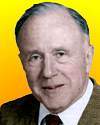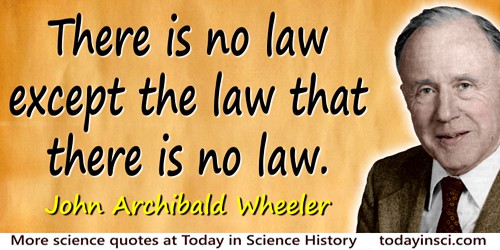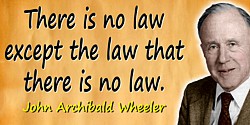 (source)
(source)
|
John Wheeler
(9 Jul 1911 - 13 Apr 2008)
American physicist who helped develop the theory of nuclear fission. He coined the terms black hole and wormhole used in astronomy. His contributions to other subjects include fundamental work in nuclear structure, scattering theory, relativity and geometrodynamics. The Nobel prize-winning physicist, Richard Feynman, was one of his students.
|
John Wheeler Quotes on Law (6 quotes)
>> Click for 33 Science Quotes by John Wheeler
>> Click for John Wheeler Quotes on | Black Hole | Physics | Universe |
>> Click for 33 Science Quotes by John Wheeler
>> Click for John Wheeler Quotes on | Black Hole | Physics | Universe |
[The black hole] teaches us that space can be crumpled like a piece of paper into an infinitesimal dot, that time can be extinguished like a blown-out flame, and that the laws of physics that we regard as “sacred,” as immutable, are anything but.
— John Wheeler
In John A. Wheeler and Kenneth Ford, Geons, Black Holes & Quantum Foam: A Life in Physics. Quoted in Dennis Overbye, 'John A. Wheeler, Physicist Who Coined the Term Black Hole, Is Dead at 96', New York Times (14 Apr 2008).
Individual events. Events beyond law. Events so numerous and so uncoordinated that, flaunting their freedom from formula, they yet fabricate firm form.
— John Wheeler
'Frontiers of Time', cited in At Home in the Universe (1994), 283. Quoted in James Gleick, Genius: the Life and Science of Richard Feynman (1993), 93.
The laws of physics must provide a mechanism for the universe to come into being.
— John Wheeler
As restated in Alan Lindsay Mackay, A Dictionary of Scientific Quotations (1991), 260. Compare with P.C.W. Davies, God and the New Physics (1984), 39, for quotation footnoted from J.A. Wheeler, 'Genesis and observership', Foundational Problems in the Special Science (1977), 39.
The only thing harder to understand than a law of statistical origin would be a law that is not of statistical origin, for then there would be no way for it—or its progenitor principles—to come into being. On the other hand, when we view each of the laws of physics—and no laws are more magnificent in scope or better tested—as at bottom statistical in character, then we are at last able to forego the idea of a law that endures from everlasting to everlasting.
— John Wheeler
In 'Law without Law' (1979), in John Archibald Wheeler and Wojciech Hubert Zurek (eds.), Quantum Theory and Measurement (1983), 203.
The universe came into being in a big bang, before which, Einstein’s theory instructs us, there was no before. Not only particles and fields of force had to come into being at the big bang, but the laws of physics themselves, and this by a process as higgledy-piggledy as genetic mutation or the second law of thermodynamics.
— John Wheeler
In 'The Computer and the Universe', International Journal of Theoretical Physics (1982), 21, 565.
There is no law except the law that there is no law.
— John Wheeler
Quoted in James Gleick, Genius: the Life and Science of Richard Feynman (1993), 93.
See also:
- 9 Jul - short biography, births, deaths and events on date of Wheeler's birth.




 In science it often happens that scientists say, 'You know that's a really good argument; my position is mistaken,' and then they would actually change their minds and you never hear that old view from them again. They really do it. It doesn't happen as often as it should, because scientists are human and change is sometimes painful. But it happens every day. I cannot recall the last time something like that happened in politics or religion.
(1987) --
In science it often happens that scientists say, 'You know that's a really good argument; my position is mistaken,' and then they would actually change their minds and you never hear that old view from them again. They really do it. It doesn't happen as often as it should, because scientists are human and change is sometimes painful. But it happens every day. I cannot recall the last time something like that happened in politics or religion.
(1987) -- 


